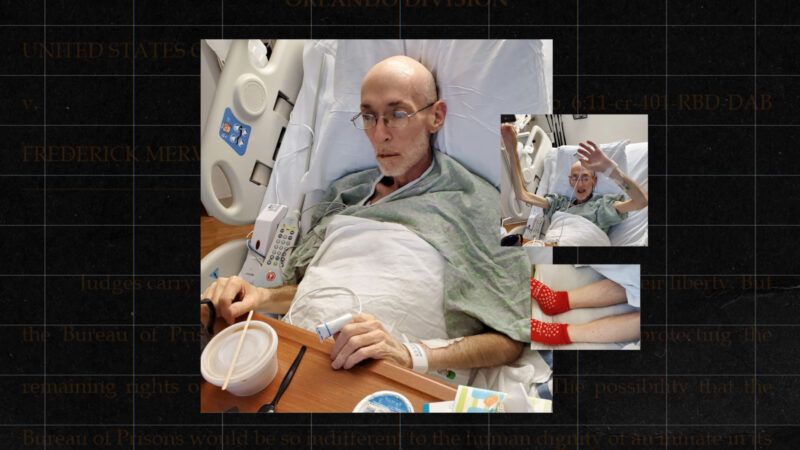Justice Department Inspector General Launches Investigation Into Inmate Death Following Judge's Contempt Order
Reason first reported last week on the scathing contempt order, which said the Bureau of Prisons should be "deeply ashamed" of its conduct.

After an outraged judge issued an order holding the Bureau of Prisons (BOP) in civil contempt for allowing an incarcerated man to waste away from treatable cancer—first reported by Reason last week—the Office of Inspector General for the Justice Department announced on Friday that it is launching an investigation into the case.
Justice Department Inspector General Michael Horowitz said in a press release that his office would investigate the circumstances of federal inmate Frederick Bardell's death due to colon cancer. U.S. District Judge Roy Dalton for the Middle District of Florida Orlando Division requested the investigation in his contempt order, writing that the Bureau of Prisons' cruel treatment of Bardell, as well as its misrepresentations to his court, were "inconsistent with the moral values of a civilized society and unworthy of the Department of Justice of the United States of America."
Sen. Dick Durbin (D–Ill.) tweeted that the case was "appalling" and called for an investigation.
The details unveiled in this case are appalling, and may not be isolated. Given BOP's disgraceful actions in this case, I'm asking the DOJ IG to investigate BOP's treatment of medically vulnerable individuals both while incarcerated and upon their release. https://t.co/L3nTxiqiYZ
— Senator Dick Durbin (@SenatorDurbin) October 12, 2022
Criminal justice advocates say the case is another example of why the BOP needs more oversight. Earlier this month, bipartisan legislation was introduced in both the House and Senate that would create an independent ombudsman to act as a BOP watchdog.
"I am glad the IG is going to look into this matter, but, frankly, we need more investigations to occur before people die, not after," says Kevin Ring, president of the criminal justice advocacy group FAMM. "That's why we are pushing for independent oversight of prisons. We need to prevent these tragedies instead of reacting to them."
Bardell was convicted in 2012 of downloading child pornography from a peer-to-peer file-sharing website and sentenced to 151 months in federal prison. In November 2020, he filed a motion for compassionate release, arguing that he likely had advanced colon cancer. An affidavit from a doctor accompanying his motion said he had "a high likelihood of having cancer of the colon with likely metastasis to the liver."
Dalton denied Bardell's motion, largely based on reassurances from the BOP that Bardell was receiving adequate treatment and that no one had determined his condition was life-threatening. He was not being treated.
Bardell filed a second motion for compassionate release in February 2021, this time with an affidavit from an oncologist. The oncologist wrote that a more than year-long delay in getting Bardell a colonoscopy after he first noticed rectal bleeding "allowed this tumor to progress from a stage III with an average cure rate of 71 percent in November 2019 to a stage IV disease in September 2020."
That delay would "more likely than not, cost Mr. Bardell his life in a matter of weeks to months," the oncologist wrote.
The government again opposed Bardell's motion, arguing that it was still not definitive that Bardell even had cancer. However, this time Dalton ordered Bardell to be released as soon as the U.S. Probation Office crafted a proper release plan for him.
But that's not what happened. Instead, the BOP immediately released Bardell and forced his parents to pay nearly $500 for a commercial flight to get their dying son home. By that point, Dalton wrote, Bardell "had a tumor protruding from his stomach and was visibly weak and bleeding." As Reason reported last week:
Although he had to be pushed out of prison in a wheelchair, a BOP van dropped Bardell off on a curb outside the Dallas/Fort Worth airport without a wheelchair and left him there. Bardell was weak, as well as bleeding and soiling himself, but he managed to navigate the airports, layovers, and connecting flights through the help of good Samaritans. When he arrived back in Florida to meet his parents, "his father had to take off his own shirt and put it on the seat of [Bardell's lawyer's] car to absorb the blood and feces," Dalton's opinion says.
Bardell died in the hospital nine days later. Pictures accompanying Dalton's order show Bardell severely emaciated.
In his contempt order, Dalton ordered the BOP to reimburse Bardell's family for the cost of the airline ticket, as well as more than $200,000 in attorney fees for a special master appointed to investigate the case.
BOP director Colette Peters said in a statement to The Washington Post that "my heart goes out to Mr. Bardell's family, to whom I send my deepest condolences. Humane treatment of the men and women in Bureau of Prisons custody is a paramount priority. In instances where we have failed at upholding our mission, we are taking steps to find out what happened, how it happened, and how we can prevent it from happening in the future."


Show Comments (18)